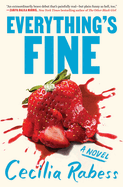
Everything's Fine is a love story but not necessarily a romance; there are no guaranteed "happily ever afters" to be found in the pages of Cecilia Esther Rabess's complex, thought-provoking debut novel. It asks big questions about where love fits amidst race, politics, identity and values in the lead-up to the 2016 United States presidential election.
After graduating from college, Jess has landed something of a dream job at Goldman Sachs, with a paycheck large enough to cover rent and her student loan debt and still buy fancy shoes and go out with girlfriends. And along with debt-capacity models and credit-risk analyses, federal fund rates and LIBOR (the London Inter-Bank Offered Rate) and a key card that doesn't work in the company gym, there is Josh: Jess's former classmate, now assigned to be her mentor in her first months on the job.
As one of the only women and one of the only Black people (and definitely the only Black woman) working in the "bullpen" of financial associates, Jess finds Josh all too secure in his place as a white male in the office, in the company, in the world, to ever be approachable. But the two can't seem to keep out of one another's orbit: first appearing side by side in the student paper following the historical election of Barack Obama in 2008 (and representing very opposite opinions on his success); arguing about reverse racism and affirmative action in a course on Supreme Court topics; antagonizing each other loudly over cheap drinks at a local dive bar they both show up to with their friends. She is Black, liberal, constantly trying to prove herself and solidify her place in a world shaped by whiteness and white supremacy. He is white and conservative, and assured that he is always in the right, that everything will work out for him. They are wildly, entirely different. And yet there's something that binds them.
The antagonism between the two is palpable--first of the political variety, and ultimately, a kind of uneasy friendship underwritten by a decidedly sexual tension. In what reads like the ultimate take on the "opposites attract" trope, Jess and Josh become an item and fall deeply, madly in love, alternating between verbal sparring and intense passion in a relationship that seems to work, even when it doesn't. "Sometimes you make me really, really, really mad," Jess tells Josh after he utters yet another comment that downplays the role of race in her experience as a Black woman. "But other than that, he is perfect, they are perfect, she has never been more in love, everything's totally fine."
This is where Rabess shines, building nuanced, multi-layered characters in an equally nuanced, multi-layered relationship, two people who are seemingly incompatible and yet undeniably work together... most of the time. Within this incredibly complex relationship, Everything's Fine becomes more than the love story at its center, as Rabess probes into deep, messy questions of race, politics and personal values--and the ways these appear within Jess and Josh's relationship, particularly as the political landscape shifts in the tense lead-up to the 2016 election. Jess herself questions their compatibility time and time again:
" 'I'm Black, you're white. I'm liberal, you're conservative....' Said that way it almost sounds like poetry. Opposites attract. The best kind of love story. But that's not quite right.... They're not really opposites. More like two people playing for different teams."
Is there something inherently incompatible about this arrangement? Between a liberal and a conservative? A Black woman and a white man? And what of the larger context, a country increasingly polarized and political parties with increasingly disparate values? "Love conquers all, except geography, and history, and contemporary sociopolitical reality."
Rabess asks all of this, but--it's important to note--does not offer easy answers to these questions. Everything's Fine is as complex and complicated as the world it reflects, messy and interconnected and imperfect in the most realistic ways. The result is a love story, as noted, without a clear happy ending; not only is a happily-ever-after not guaranteed here, it's not even clear what a happy ending would be. The two staying together? Or splitting up? Finding a compromise, or converting to the same political party? What's realistic, what's believable, what's acceptable and what's desired, what will make them happy in the end--the answers to each will vary depending on the reader and what they bring to the story, their context and perspective and beliefs. What is guaranteed is that Everything's Fine will leave every reader thinking more deeply about all of these questions in the way the best of fiction does, pondering Jess and Josh's story long past the last page and also asking themselves about love and race and politics and how they intersect in a messy world. --Kerry McHugh

